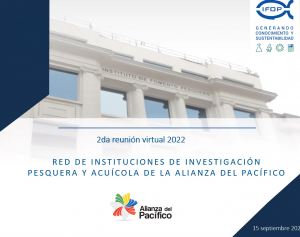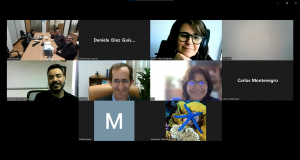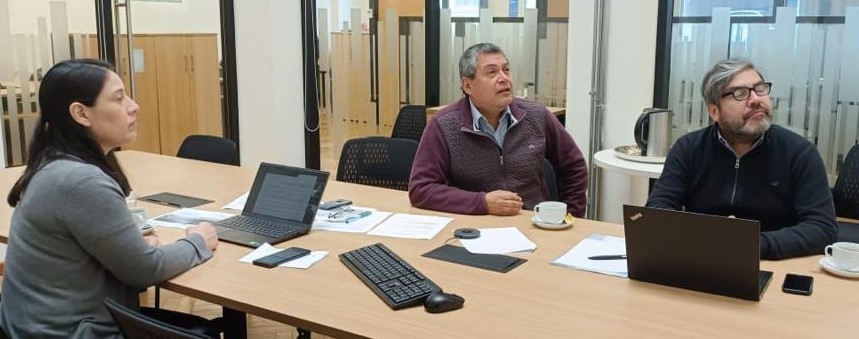IFOP assumes Pacific Alliance Network Executive Secretariat of Fisheries and Aquaculture Research Institutions.
October 14th, 2022 On September 15th, the 2nd virtual meeting of the year 2022 of the Network of Fisheries and Aquaculture Research Institutions of the Pacific Alliance (IIPA/AP network) was held. This is a network that was born in the context of the 2017 Work Plan of the ad hoc group on Fisheries and Aquaculture of the Pacific Alliance and is made up of IFOP (Chile), INVEMAR (Colombia), INAPESCA (Mexico) and IMARPE (Peru). , and INIDEP (Argentina), SCIRO (Australia) and FAO have also participated as observer institutions, considering that the network is open to organizations or institutes that wish to participate. Its purpose is to constitute an integration instance to advance progressively towards the best generation of scientific knowledge in fishing and aquaculture for the sustainable management of these resources in the countries of the Pacific Alliance.
On September 15th, the 2nd virtual meeting of the year 2022 of the Network of Fisheries and Aquaculture Research Institutions of the Pacific Alliance (IIPA/AP network) was held. This is a network that was born in the context of the 2017 Work Plan of the ad hoc group on Fisheries and Aquaculture of the Pacific Alliance and is made up of IFOP (Chile), INVEMAR (Colombia), INAPESCA (Mexico) and IMARPE (Peru). , and INIDEP (Argentina), SCIRO (Australia) and FAO have also participated as observer institutions, considering that the network is open to organizations or institutes that wish to participate. Its purpose is to constitute an integration instance to advance progressively towards the best generation of scientific knowledge in fishing and aquaculture for the sustainable management of these resources in the countries of the Pacific Alliance.
 The meeting was organized by IFOP, which assumed the Executive Secretariat of the Network for the period 2022-2023 and had the objective of reactivating coordination between institutions and generating a proposal for a Work Plan for the remainder of the year 2022 and for the year 2023. It was attended by Colombia, Peru, Mexico, Argentina, and representatives of the FAO and the Undersecretary of Fisheries and Aquaculture. From IFOP, the Executive Director, Gonzalo Pereira, Dr. Carlos Montenegro, Head of Fisheries Assessment Department and Dr. Daniela Díaz, in charge of Cooperation and International Affairs, participated.
The meeting was organized by IFOP, which assumed the Executive Secretariat of the Network for the period 2022-2023 and had the objective of reactivating coordination between institutions and generating a proposal for a Work Plan for the remainder of the year 2022 and for the year 2023. It was attended by Colombia, Peru, Mexico, Argentina, and representatives of the FAO and the Undersecretary of Fisheries and Aquaculture. From IFOP, the Executive Director, Gonzalo Pereira, Dr. Carlos Montenegro, Head of Fisheries Assessment Department and Dr. Daniela Díaz, in charge of Cooperation and International Affairs, participated.
Dr. Daniela Díaz commented “among other commitments, it was agreed to work on development of an internship program that allows researchers to learn about and participate in the scientific work that is carried out in the different research institutions that make up the network. Likewise, the development of the next face-to-face meeting was agreed, which will be organized by INVEMAR, in Colombia.
The reactivation of this instance is very relevant since it allows strengthening cooperation between research institutions, identifying cross-cutting topics of interest that can be addressed jointly, thus facilitating and promoting the generation of scientific knowledge”.
